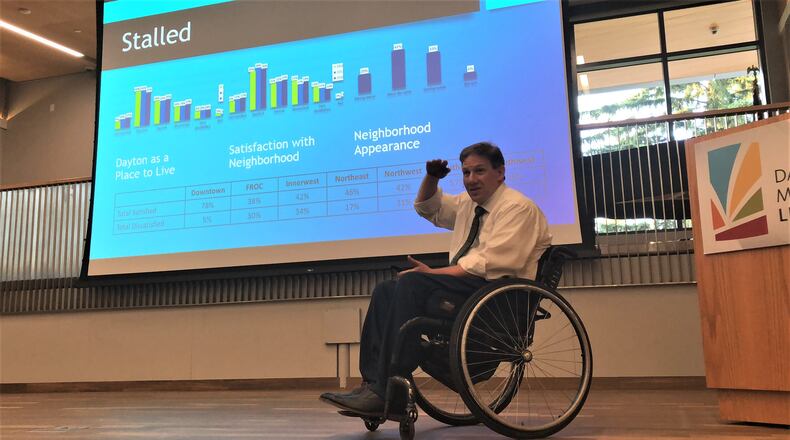About 29 percent of Dayton’s millennials (residents ages 18 to 34) say they are unlikely to stay in the city in the next five years, according to the city’s annual survey.
That compares to 21 percent of Gen-Xers who say they are unlikely to remain here, 13 percent of baby boomers and 5 percent of seniors.
About 30 percent of millennials say they are not sure if they will stay or that it depends.
So what explains this? Some residents think it has to do with housing and opportunities.
On Monday night, Darryl Fairchild, Dayton’s newest city commissioner, hosted a town hall at the Dayton Metro Library.
Visitors were encouraged to ask questions and share their concerns about conditions in the city.
Multiple speakers said the city needs to do more to attract and retain millennials.
Many millennials who are starting out in their careers and want to live downtown cannot afford the condos and homes for sale, Jamie Rippey
Rippey asked what initiatives the city has planned to bring housing downtown that is within their budgets.
Few homes are for sale downtown, and some cost more than $300,000. Most oKillshot - Singlef the new housing that's opened downtown is apartments, which aren't exactly cheap.
Chris Goodwine, 32, who lives in the Dayton View area, said she wants to know what the city is doing to attract employers to the west side.
Many people live in those neighborhoods, but the lack of jobs and things to do so will make it hard to hold onto young residents, she said.
She said she can’t get a salad after 7 p.m. anywhere near her. She said it’s frustrating that there’s no places in her part of town to spend her money.
“Everything … that’s going on downtown is pretty awesome, but as a millennial myself, and after the big hit that we took with Good Sam (closing), it’s really hard to stay in Dayton when there’s nothing on my side of town,” she said.
MORE: Who’s optimistic about Dayton? Millennials, recent arrivals, wealthier
Millennials and first-time homebuyers are needed to help revitalize the city’s deteriorating neighborhoods, said Monica Snow, an Oregon District resident.
The city, Snow said, should research best practices in other communities to improve local neighborhoods.
She said the private sector and nonprofit organizations hopefully can help provide resources to offer incentives and programs for things like rehabbing homes.
At the end of the town hall, Fairchild said the city needs to focus its efforts to better engage the youth and offer programming for young people.
“I think that’s the biggest resource that we squander,” he said.
About the Author

